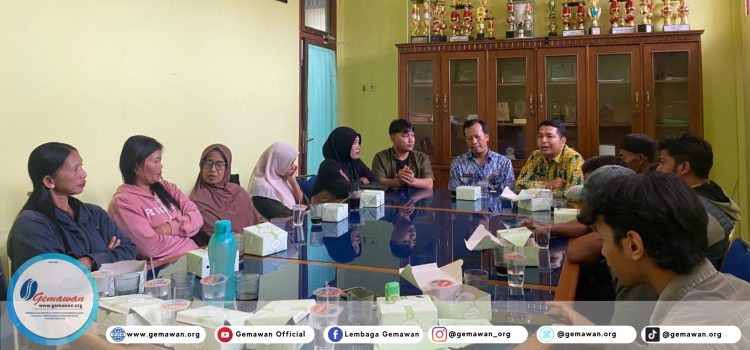
Gemawan reaffirmed its commitment to strengthening the bargaining position of local farmers through an advocacy training held earlier this week. The training did not stop at capacity building—it was immediately translated into concrete action: facilitating representatives of farmers to engage in a direct dialogue with the Mempawah Agriculture Office on Thursday (20/11/2025).
This audience marked a strategic step to ensure farmers’ voices no longer remain at the level of discourse but enter policy spaces where key decisions are made.
Farming Problems Are Not Merely Technical — They Concern Access, Justice, and Governance
Lani Ardiansyah from Gemawan opened the meeting by presenting the findings from a problem-mapping process, showing that the roots of agricultural challenges in Mempawah are deeply structural.
“Delays in the distribution of subsidized fertilizer may reduce harvest yields; irrigation needs still rely on inadequate infrastructure; and rising commodity prices do not offset the increasing production costs. These are not merely technical issues—they are governance issues,” emphasized Ucup, his nickname.
Farmers’ Voices: Damaged Roads, Unequal Fertilizer Distribution, and Threatened Production
Soleh, a farmer from Galang Village, highlighted three critical issues. “Access roads for production are damaged, information on fertilizer subsidies is unclear, and our multicultural products receive little attention,” he said.
Dinda from Bunbun Village underscored another pressing need. “Fertilizer distribution is relatively stable, but we lack pest-control supplies and access to quality seeds. These determine our harvest outcomes,” she explained.
Meanwhile, Halimah from Jungkat Village described the threat of flooding that destroys rice seedlings. “Seedlings we have already planted can die underwater when floods come. The losses are entirely on us,” she stressed.
Agriculture Office: Budget Cuts and Policy Constraints
Heri, representing the Agriculture Office, acknowledged that the issues raised by farmers are critical indicators that need to be escalated to the national level.
“Improving production roads has been hindered by budget cuts over the past three years. For subsidized fertilizer, we can conduct a joint review with farmer associations. Pest management can be proposed through the development planning forum (musrenbang), while flooding is linked to climatic conditions and requires land operations,” Heri explained.
Oktav added that verification processes and policymaking cannot move forward without cross-sector collaboration.
“The outcomes of this training are vital inputs for policy formulation. Many issues require collective action and pressure from multiple avenues for change to happen,” he stated.
Advocacy: A Political Movement of Farmers
Gemawan emphasized that farmer advocacy must no longer stop at report-writing or ceremonial meetings. The mentoring model used aims to ensure that farmers become subjects—not objects—in policy processes.
This audience demonstrates that when farmers are encouraged to voice their concerns directly, policy spaces become more accessible, and the government can no longer ignore the realities they face on the ground.
